For years, many speculated what Syria—a country with deep religious and cultural diversity—would look like if the armed, extremist-dominated opposition managed to overthrow Bashar al-Assad’s government.
Early in the war, even Assad’s staunchest critics began to grasp the grim reality: the alternative to his authoritarian rule would be far worse. Now, with the collapse of his government, that bleak scenario has come to pass, and Syria is witnessing the consequences of this radical shift in power.
On 29 January, the Military Operations Department of the de facto government in Syria announced that Ahmad al-Sharaa—previously known by his nom de guerre Abu Mohammad al-Julani—would assume the presidency of the country during a “transitional phase.”
The announcement included the suspension of the country’s constitution and the dissolution of the previously ruling Baath Party, the People’s Assembly, the former national army, security services, and all armed factions—including Sharaa’s own Hayat Tahrir al-Sham (HTS), the former Al-Qaeda affiliate in Syria.
Giving a speech at this so-called “Victory Conference” was Ahmad al-Hayes, also known as Abu Hatem Shaqra, the leader of the Ahrar al-Sharqiya faction of the Turkish-backed Syrian National Army (SNA) force—an organization responsible for numerous war crimes.
With this, the world was forced to ask: Who are the key figures now ruling Syria, and what does this mean for its future?
To understand today’s events, it is necessary to rewind a decade. In 2015, the northwestern city of Idlib fell to the Nusra Front, which U.S. official Brett McGurk once described as the “largest Al-Qaeda safe haven” in the world. While other parts of Syria saw different terror organizations come and go, lose ground and gain ground, and eventually get defeated by the Syrian Arab Army (SAA) and its allies over the years—Idlib remained under the control of the Nusra Front.
In 2015, the Nusra Front was rebranded into Jaish al-Fatah. The following year, it was rebranded again into Jabhat Fateh al-Sham and severed relations with Al-Qaeda in an attempt to legitimize itself. It finally became known as HTS in 2017.
This was all done with Qatari support and with the help of the Syria-based Saudi Wahhabi cleric Abdullah al-Muhaysni, who sent teenagers on suicide missions and was responsible for the recruitment of thousands upon thousands of extremist militants. He is now roaming freely across Syria, giving speeches.
Muhaysni congratulates mother of a boy he is about to send on a suicide mission in #Aleppo & assures her he will get his virgins 😂 #Syria pic.twitter.com/p4XQKsphSy
— Ibn Walid (@walid970721) October 29, 2016
HTS set up a political administration in the ‘liberated’ Idlib governorate and began its rule—creating the prototype for the government that now rules the majority of the country, including Damascus.
In December 2024, the unthinkable happened. After an 11-day lightning offensive, HTS-led fighters stormed Damascus, toppling Assad’s government. With foreign backing, notably from Turkiye and, more recently, Ukraine, along with strategic deceit, the former Al-Qaeda offshoot achieved what no faction before it had: seizing control of Syria’s capital and claiming rule over the country.
A government appointed and led by such an organization could only consist of a wide array of questionable characters. The following are some of the most prominent figures leading the new Syria.
The newly announced President of Syria, Ahmad al-Sharaa
In an earlier life, HTS’s leader, Ahmad al-Sharaa, had studied media briefly and then joined the medicine faculty at Damascus University before leaving to join Al-Qaeda in Iraq (AQI) following the 2003 U.S. invasion.
His notorious resume includes being the former deputy to ISIS chief Abu Bakr al-Baghdadi back when the infamous terror group was known as the Islamic State of Iraq (ISI). Sharaa was dispatched by Baghdadi in 2011 to enter the war against Assad’s government in Syria, where he took part in the launching of deadly suicide attacks against both security personnel and civilians before founding the Nusra Front in 2012.
The Nusra Front, which was Al-Qaeda’s official branch in the Levant, would go on to terrorize both the Syrian and Lebanese people for years under Sharaa’s leadership. During his days in Iraq, Sharaa started as a member of ISI’s precursor, AQI—itself responsible for many indiscriminate attacks, including bombings of religious sites and the killing of civilians and worshippers—in an effort to trigger a sectarian war.
After his release from the U.S.-run Camp Bucca in 2008, where he had been detained alongside Baghdadi and many future ISIS leaders, Sharaa served as ISI’s Emir of Mosul—a period that witnessed many killings and kidnappings of Christians and Yazidis.
After assuming leadership of Syria in December 2024, the Iraqi judiciary issued an arrest warrant for Sharaa. Sources cited by Shafaq news agency said detainees in Iraq had confessed to crimes that involved him personally. Yet Sharaa is now sitting down with international leaders, including U.S. and European officials. After he met with a delegation from Washington in Damascus last month, a U.S. terror designation and $10 million dollar bounty for Sharaa’s capture was swiftly lifted.
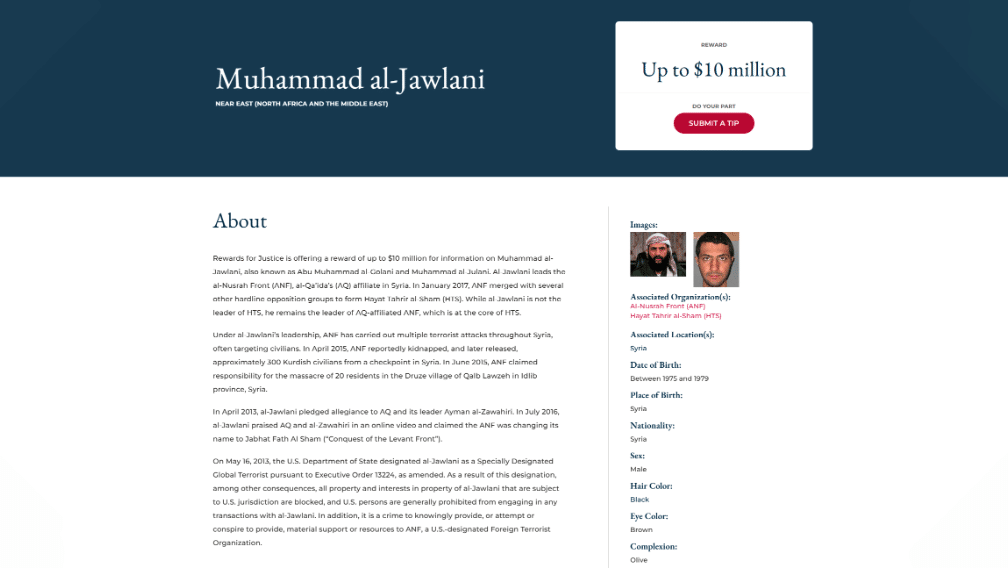
A screenshot of the U.S. government’s official website showing a $10 million reward for information on Abu Mohammad al-Julani
The new unelected Syrian president has recently held meetings with the head of the International Criminal Court (ICC), Karim Khan, Lebanon’s caretaker prime minister Najib Mikati, and Qatari Emir Tamim bin Hamad Al-Thani — the first head of state to meet with the former Nusra leader. His meeting with Mikati was a shock and disappointment to many Lebanese who remember the Nusra Front’s crimes against the country, such as deadly suicide attacks, kidnappings and executions of Lebanese soldiers, and the infiltration and occupation of the country’s territory near the Syrian border.
Extremists leading Syria’s new army
The so-called Syrian Armed Forces now include non-Syrian commanders, many of them veterans of Al-Qaeda and ISIS. Sharaa has declared that the foreign militants “should be celebrated” as “part of the movement that led to the downfall of Assad.” He has also said that the foreign fighters who remain in Syria could potentially be granted Syrian citizenship.
Abdulaziz Dawood Khudaberdi, a Chinese Uyghur militant from the Turkistan Islamic Party (TIP), has been appointed brigadier-general.
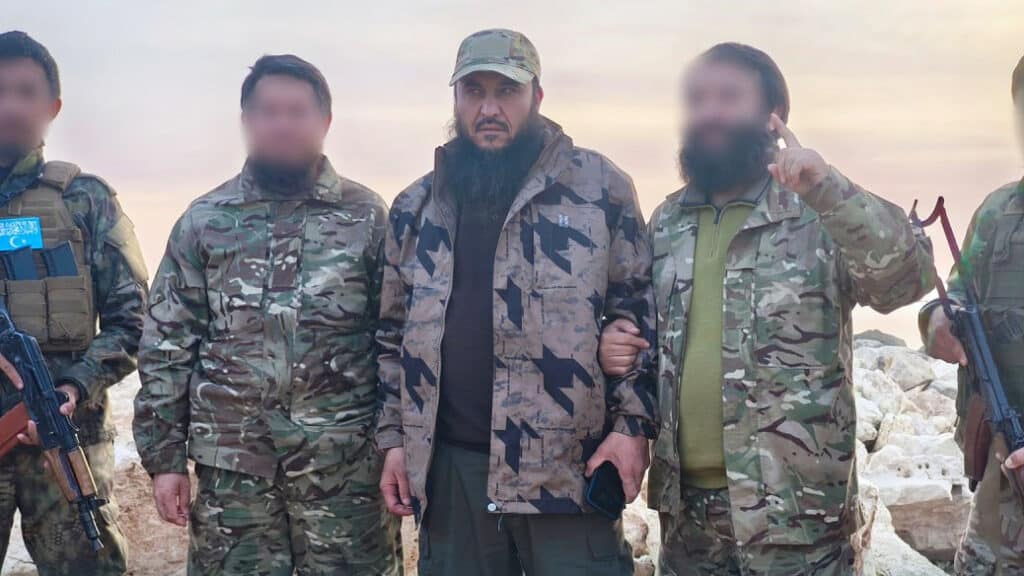
Chinese Uyghur militant, Abdulaziz Dawood Khudaberdi, from the Turkistan Islamic Party, who was appointed as brigadier-general in the new Syrian army
TIP is an Uyghur militant organization that has fought under HTS’s command for years. Its fighters illegally entered Syria post-2011, like the tens of thousands of other foreign fighters from numerous different nations who came to the country to fight against the former state.
TIP has called for the establishment of an Islamic state in parts of China and central Asia, and is seen by Beijing as a serious threat to its interests and security. Another two Uyghur fighters, Mawlan Tarsoun Abdussamad and Abdulsalam Yasin Ahmad, have been made colonels.
Turkish citizen Omar Mohammed Jaftashi and Jordanian citizen Abdul Rahman Hussein al-Khatib have also been made brigadier-generals.
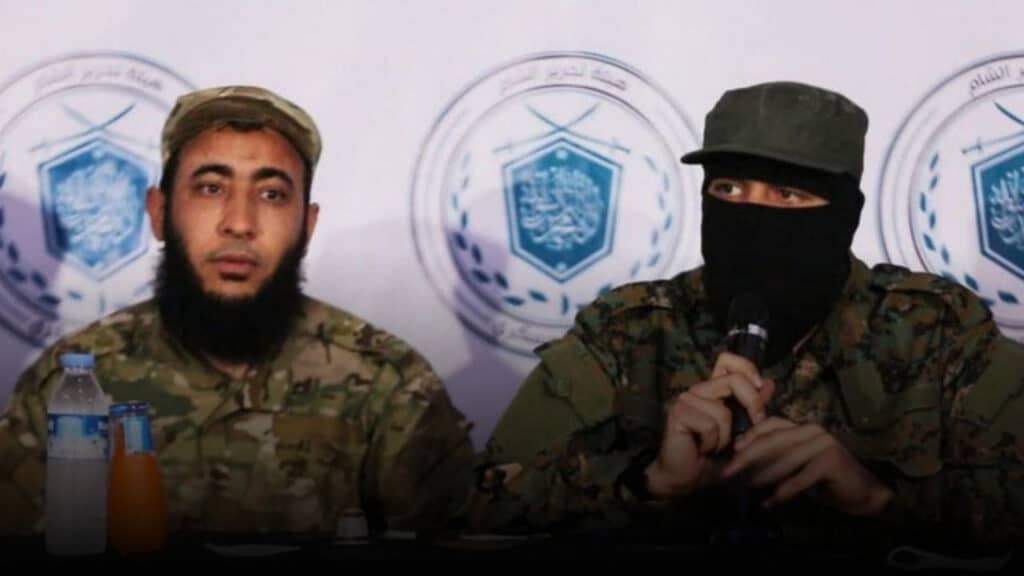
Jordanian citizen Abdul Rahman Hussein al-Khatib (right) who was appointed as brigadier-general in the new Syrian army
Additionally, Tajik fighter Saifiddin Tojiboev, wanted in his home country, Tajikistan, for membership in terrorist organizations and the recruitment of extremist militants, according to an anonymous Tajik law enforcement source cited by Radio Free Europe (RFE), was appointed as a colonel.
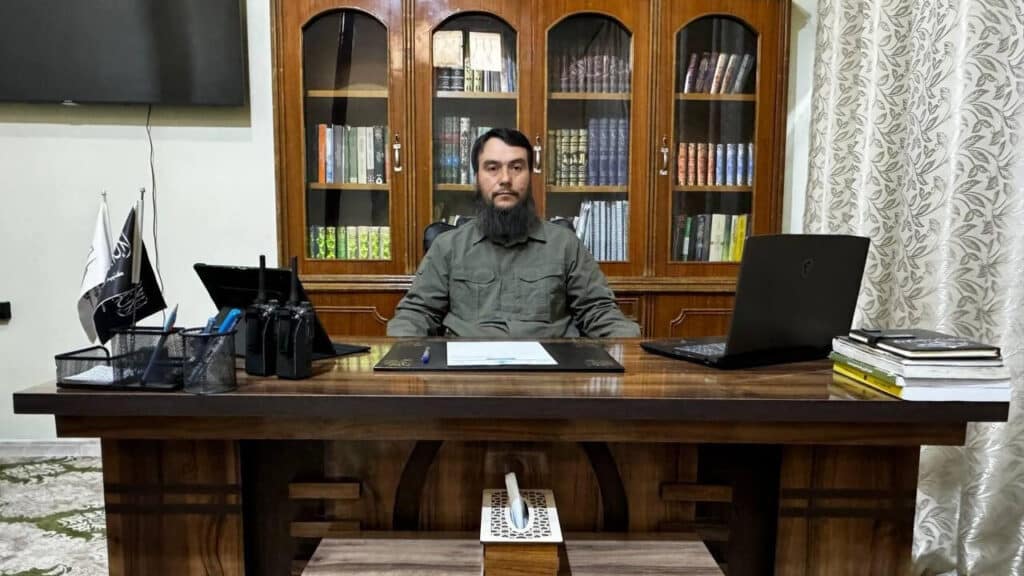
Tajik fighter Saifiddin Tojiboev who was appointed as a colonel in the new Syrian army
Abdul Jashari, an Albanian extremist, now holds the rank of colonel. Omar Mohammed Jaftashi, a Turkish citizen, has been made a brigadier-general. And the list goes on.
Syrian Justice Minister, Shadi Mohammad al-Waisi
Shadi Mohammad al-Waisi, made justice minister in December, was formerly a judge in the Nusra Front and holds a degree in Islamic Sharia. He is currently pursuing a master’s degree in Islamic Studies. In 2011, he helped found the Sharia Authority in Aleppo’s Daharat Awad district, where he served as a judge before taking part in the creation of the Four-Party Sharia Authority in Aleppo in 2012.
Waisi continued to rise in rank, serving as a military penal judge, an appeals judge, and a public prosecutor. He also headed many courts in Aleppo during the years of the Nusra Front’s violent rule in the ancient city.
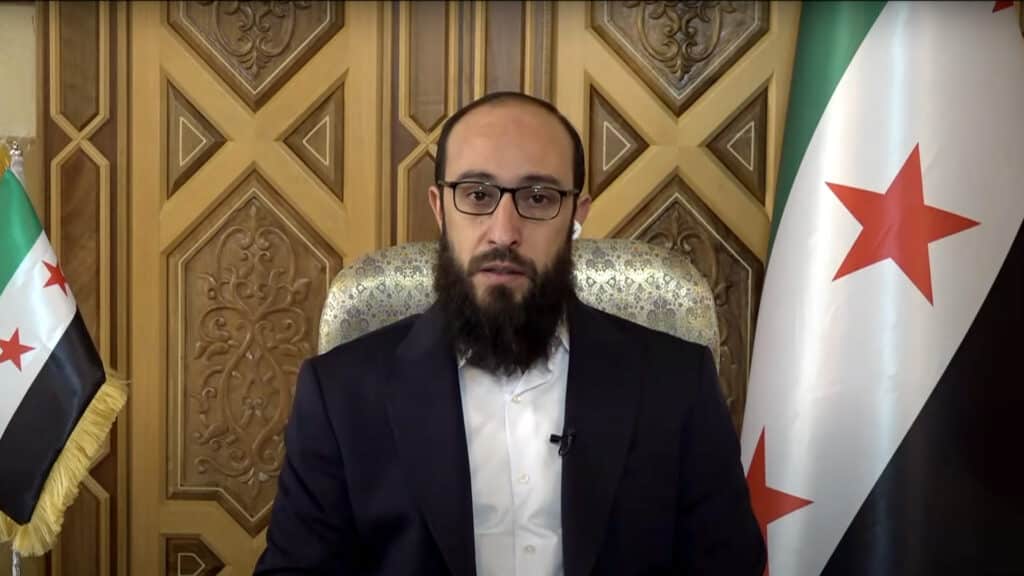
Newly appointed Justice Minister Shadi Mohammad al-Waisi
Recently, verified videos emerged of Waisi overseeing the public execution of women accused of prostitution and adultery in 2015, drawing nowhere near enough condemnation and going largely unnoticed in mainstream media.
An official from the new government told the news verification outlet Verify-Sy that the footage “documents the enforcement of the law at a specific time and place, where the procedures were carried out in accordance with the laws in effect at that time,” and that it “reflects a stage we have moved beyond, in light of the current legal and procedural transformations, which makes it inappropriate to generalize it or use it to describe the current stage, given the differing circumstances and references.” Of course, the justice minister will not be brought to justice for his crimes.
Syrian Defense Minister, Murhaf Abu Qasra
Murhaf Abu Qasra, also known as Abu Hassan 600, was appointed minister of defense after the fall of Assad’s government. He holds a bachelor’s degree in agricultural engineering, has been a top leader in HTS’s military wing for several years, and was responsible for the group’s drone unit, known as the Shaheen Brigades.
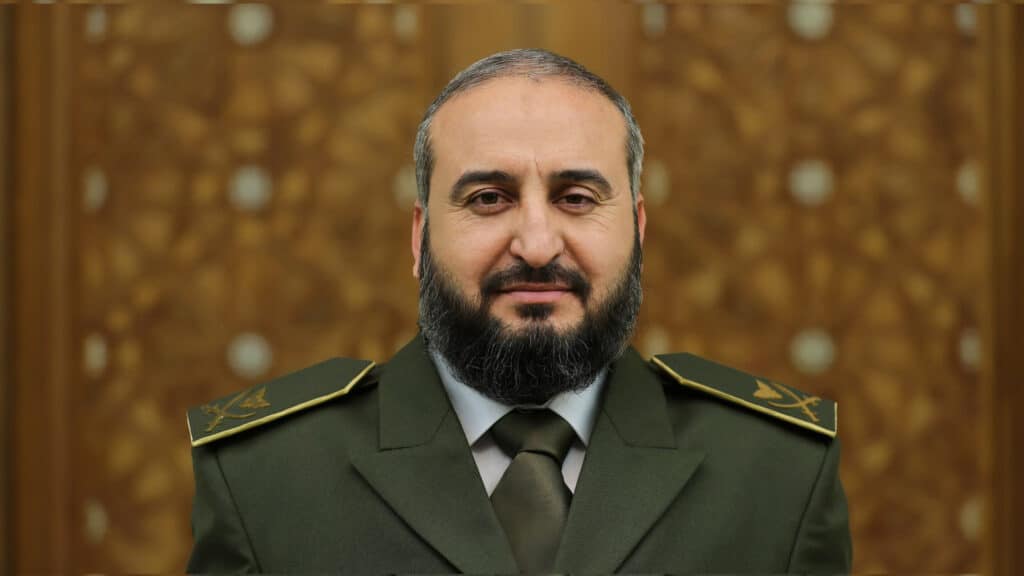
Newly appointed Defense Minister Murhaf Abu Qasra
Upon assuming his role as defense minister, reports have emerged regarding Abu Qasra’s involvement in numerous crimes and atrocities: 20 premeditated murders, 15 armed robberies, 12 amputations, 150 executions of Shias, Christians, and atheists, 15 cases of stoning to death, and 10 cases of rape of female captives (HTS, under its different names over the years, has taken its fair share of captives—and has even kidnapped nuns).
In this bizarre video, Mr. 600 is seen smiling and standing next to a medieval-looking character holding a sword and yelling the derogatory term for Alawites, “Nusayriyah.”
New Syrian government defence Minister
👇#Jolani government's Defense Minister Abu Hassan al-Hamawi: "I came here by cutting off heads..!" #syrian #syria #kurds #biden #hrw #trump pic.twitter.com/CkgmyCx1np— Botin Kurdistani (@kurdistannews24) January 3, 2025
Syrian Intelligence Chief, Anas Hassan Khattab
Anas Hassan Khattab, a co-founder of the Nusra Front alongside Sharaa and Syria’s new Foreign Minister Asaad Hassan al-Shaibani, has been appointed the head of Syrian intelligence. He studied architecture at the Damascus University before leaving for Iraq in 2008, where he went to “fight against the U.S. occupation,” according to Syria TV.
Khattab, also known as Abu Ahmed Hudood, was blacklisted as a terrorist by the UN Security Council in September 2014 for his close association with Al-Qaeda—particularly AQI.
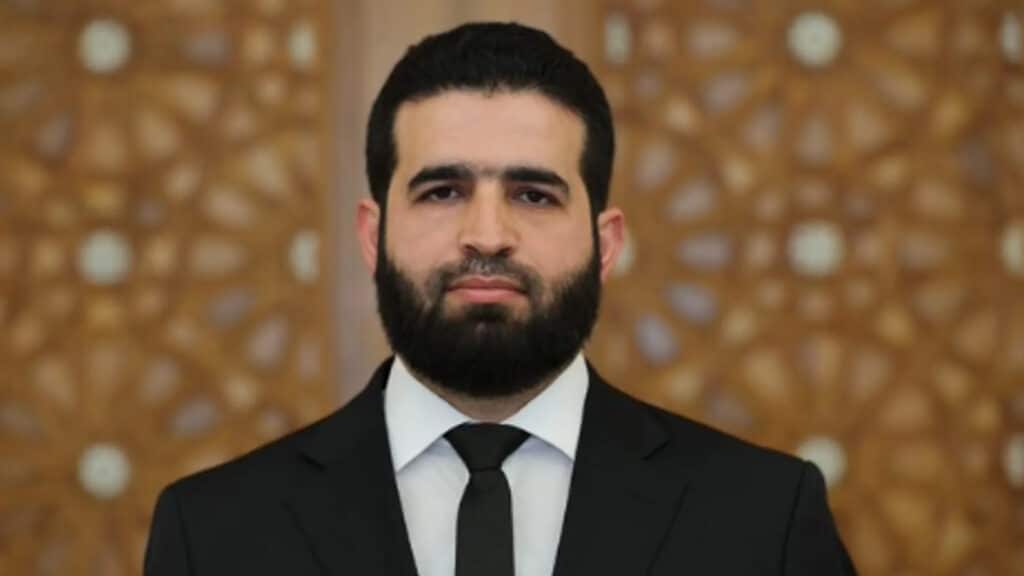
Anas Hassan Khattab, a co-founder of the Nusra Front and newly appointed Syrian Intelligence chief
According to the listing, he was for several years involved “in the financing, planning, facilitating, preparing, or perpetrating of acts or activities by, in conjunction with, under the name of, on behalf of, or in support of” and “otherwise supporting acts or activities of” the Nusra Front.
Khattab was also sanctioned by the U.S. Treasury Department in 2012 for his ties to Al-Qaeda. Syria’s new intel chief served as the administrative Emir of the Nusra Front as of early 2014 and was part of its Shura Council by mid-2013. He was also tasked with selecting personal bodyguards for Sharaa.
In recent years, Khattab oversaw general security operations in Idlib. His involvement in intelligence gathering dates back to the period when HTS consolidated control over northern Syria with Turkish support.
During this time, he managed surveillance of covert networks along the borders of HTS-controlled areas. According to an investigative report by Enab Baladi last year, Sharaa used to rely on Khattab for “internal security files and the elimination of opponents.”
Women’s Affairs Chief, Aisha al-Debs
As part of efforts to foster inclusivity, Aisha al-Debs was appointed Women’s Affairs chief. She holds a master’s degree in business administration from the Damascus University. While not much is known about her, Debs—a dual Turkish-Syrian citizen who lived in Turkiye for ten years—proclaimed honestly during a recent interview with TRT how she plans to carry out her work, stating, “I will not allow space for those who differ with me ideologically.”
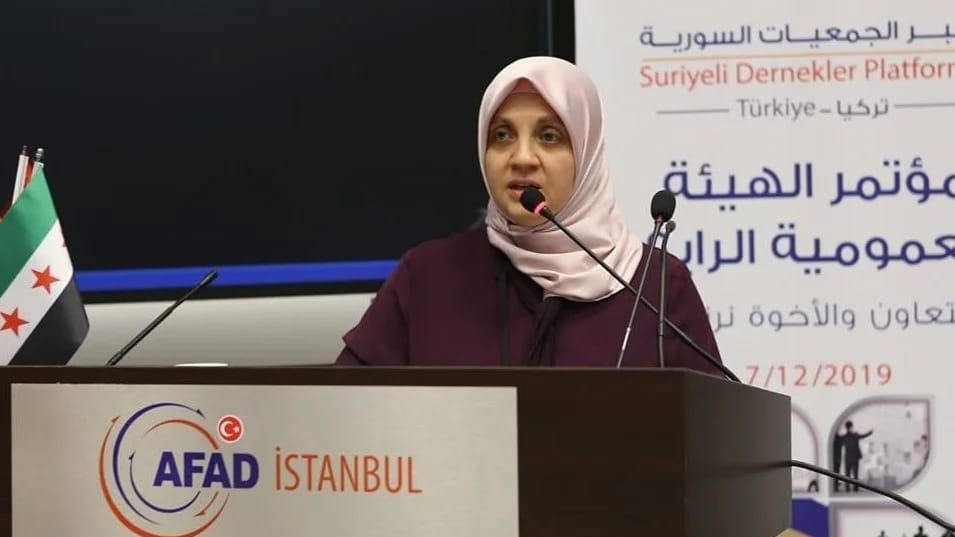
Aisha al-Debs, newly appointed Women’s Affairs chief
She added that Syria “previously suffered from training programs by foreign organizations” which harmed women and children and led to higher divorce rates. Debs went on to say that women are “primarily responsible for their families, husbands, and priorities.”
She also said Syria’s new administration aims to “create a model suited to the reality and circumstances of Syrian women,” which would be based on Islamic Sharia.
Sectarian carnage and zero ‘democracy’
Western diplomats and foreign delegation have been rushing to engage with HTS—which has touted its commitment to inclusivity and minority rights. Yet the reality on the ground is starkly different. Executions, sectarian purges, and desecration of religious sites have become routine.
Militants in Aleppo have burned the resting place and shrine of “al-Hassan bin Hamdan al-Khasibi (قدس)”, who is considered to be one of the most important figures in the Alawite sect and executed several people sheltering there accusing them of being SAA pic.twitter.com/H5PbrqD7Db
— Hassan Ridha (@sayed_ridha) December 25, 2024
In the first month of HTS rule, 150 Alawites were killed, hundreds of people arrested and subjected to torture, and Christians were expelled from the town of Maaloula. Christmas trees have been burned in public squares, and videos have circulated showing Alawites being humiliated and forced to bark like dogs.
أرهابيين الجولاني يخطفون العلويين والمسيحيين بسوريا ويضعونهم بغرف ويأمرونهم بالنباح وإصدار أصوات مثل الحيوانات Al-Julani terrorists kidnap Alawites and Christians in Syria, put them in rooms and order them to bark and make sounds like animals. pic.twitter.com/WKwyS5bR4M
— نمير الكواك (@nm_iq1) January 5, 2025
🚨🇸🇾🏴 Western media and Al Jazeera have been running a massive PR campaign to sanitize the new jihadist regime in Syria.
🧵Today we’re going to expose the sectarian violence unleashed by “moderate and inclusive” jihadists.
⚠ Warning: Graphic images below👇 pic.twitter.com/U0icqz8O4g
— NewRulesGeopolitics (@NewRulesGeo) December 27, 2024
Sharaa and other officials have promised to unify Syria, vowing to protect minorities and punish “individual” actors for any transgressions against Christians, Alawites, Shias, and others, but there are precious few indications that this is happening.
“We know the ideological affiliation of HTS and what it has done in the past, but we also hear and see the desire for moderation and understanding with other important parties. We came to Syria with an outstretched hand and clear expectations from the new administration, and the administration will be judged by its actions,” said German Foreign Minister Annalena Baerbock during her visit to Syria on 3 January, where she met with Sharaa and officials from the new government.
If the new Syria remains on this path—the HTS-led government may not last. Under such conditions, the Syrian people will not accept an administration of extremists, given its apparent inability to build a unified and diverse country.
People have already begun to take up arms, including former elements and supporters of the old Syrian army. There have also been reports of Christians fighting back against HTS.
Clashes erupt between Christians and terrorist gunmen in Damascus.
Heavy gunfire also reported in Mezzeh, #Damascus.#Syria pic.twitter.com/FaZKTJbWRd
— Vanessa Beeley (@VanessaBeeley) December 25, 2024
Until then, Syria remains hostage to a government born from Al-Qaeda, one that the west now appears disturbingly willing to engage with.

